Adjectives: An Easy Guide with Examples
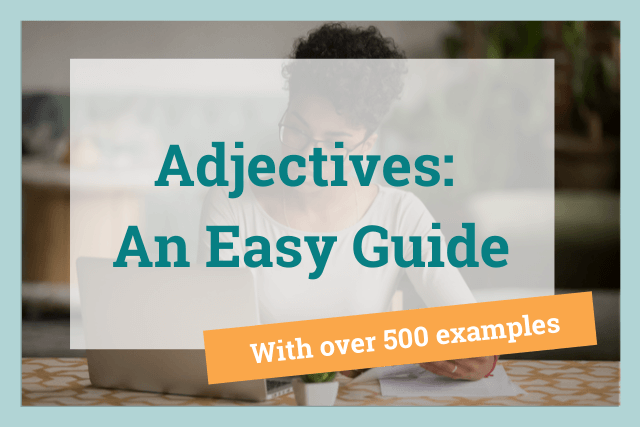
An adjective describes qualities or quantities of people, places, ideas, and things. There are negative adjectives and positive adjectives.
So, if I say the building was tall, tall is the adjective.
If we want to get a little more technical, adjectives modify or describe nouns.
A noun is a person, place, idea, or thing.
So, if you’ve used a word to describe something, like this:
- The dog was big.
... you’ve probably used an adjective.
Adjectives only modify (describe) nouns. You can’t use an adjective to modify verbs, adverbs, or other adjectives. Adverbs modify verbs.
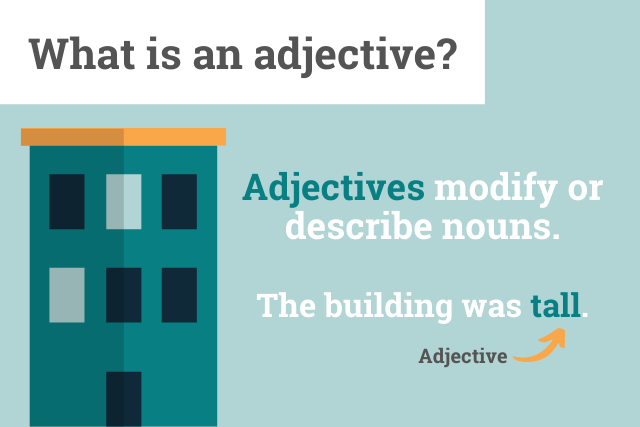
What Are the Different Types of Adjectives?
There are a few different types of adjectives.
In this article, we'll look at:
- Qualitative and quantitative adjectives
- Absolute, comparative, and superlative adjectives
- Predicate adjectives
- Adjective phrases
Quantitive and Qualitative Adjectives
Adjectives can describe the qualities of nouns. This means that they describe a noun’s size, age, shape, color, origin, material, or purpose. Qualitative adjectives can also describe an opinion on something.
For example, if we say The tree was green or The painting was pretty, the adjectives green and pretty describe qualities of the nouns tree and painting.
Adjectives can also describe quantities of nouns. Quantitative adjectives describe the amount of something.
If we say There were many trees, the adjective many describes the quantity of the trees.
All adjectives—quantitative and qualitative—fall into three main categories, each with their own rules.
What Are the Three Main Types of Adjective?
The three types of adjective are absolute adjectives, comparative adjectives, and superlative adjectives.
Don’t worry if those terms aren’t familiar—you’ll recognize each of the types when you see them.
Let’s look at some examples.
Absolute Adjectives
Absolute adjectives cannot be intensified or used to compare.
For example, if something is perfect, something else cannot be more perfect than it.
With absolute adjectives, you usually can’t add the suffix -er. Someone can’t be perfect-er than someone else.
Here are some examples of absolute adjectives:
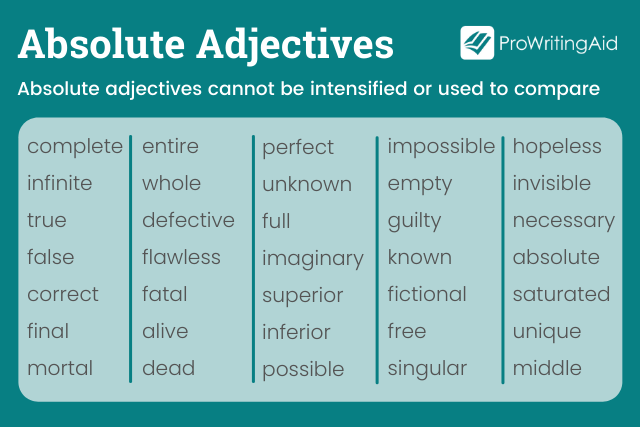
Comparative Adjectives
Comparative adjectives compare two or more objects, ideas, people, or places. For example, larger is a comparative adjective.
Comparative adjectives usually end with the -er suffix, or include the words more and less.
One of the most common mistakes people make with comparative adjectives is incorrect formation.
Here are some examples of correct and incorrect formation for comparative adjectives:
Correct: The lake was larger than the pond.
Incorrect: The lake was more large than the pond.
Correct: The book was more interesting than the movie.
Incorrect: The book was interestinger than the movie.
But how do you know which comparative adjective formation to use? Here are a few handy rules:
- If the adjective you want to use only has one syllable, add -er to the end to make it comparative, e.g. smaller, wider, bigger, sadder, colder, rounder, brighter, sharper
- If the adjective has two syllables and doesn’t end in -y, or three or more syllables, add more or less to the start, e.g. more dangerous, more effective, more intelligent, less exciting, less important, less serious
- If the adjective ends in -y, change the y to an i and add -er, e.g. sunny → sunnier, funny → funnier, shiny → shinier, happy → happier
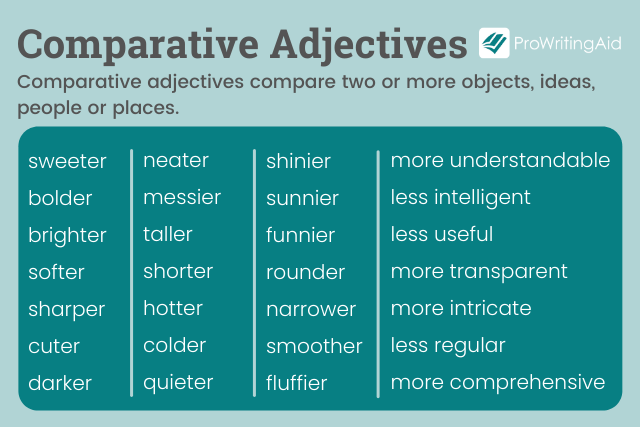
Here are some comparative adjectives in a sentence:
- The light was brighter than the sun.
- The math lesson was more boring than the English lesson.
- It is sunnier today than it was yesterday.
- She can run faster than him.
- The test was more important to her than having fun.
Superlative Adjectives
A superlative adjective describes something that is the most or least that it can be:
- It was the tallest tree in the forest.
- Our business was the fastest-growing in its field.
- We saw the most beautiful sunset.
- It was the least convincing argument I’ve ever heard.
Superlative adjectives end in -est, or are preceded by most or least.
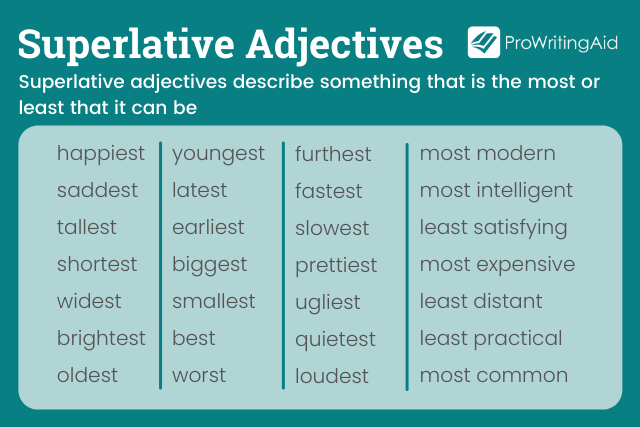
Adjectives can have comparative and superlative forms.
Here’s an example:
Adjective: Tall
Comparative form: He was taller than her.
Superlative form: He was the tallest in the school.
How to Use Adjectives in a Sentence (with Examples)
Most adjectives can come before or after the noun in a sentence:
- The dark sky → The sky is dark
- The fluffy cat → The cat is fluffy
- The interesting book → The book is interesting
But in many cases, the adjective can’t come directly after the noun.
For example, if you want to describe someone’s hair as curly, you can’t say Their hair curly. You’ll need to add a verb, e.g. Their hair was curly.
Adjectives that come before a noun or after a noun and verb like this are called attributive adjectives.
When Can I Put an Adjective Directly After a Noun?
Short answer? Yes. Here’s why.
Some phrases, titles, or names of institutions will place an adjective directly after a noun:
- Time immemorial
- Queen consort
- Poet Laureate
The adjectives here (highlighted) are called postpositive adjectives. The word postpositive just means that the adjective comes directly after (post) the noun.
Here are some postpositive adjectives in a sentence:
- Something terrible has happened.
- It was the best job available at the time.
- I had the worst time imaginable.
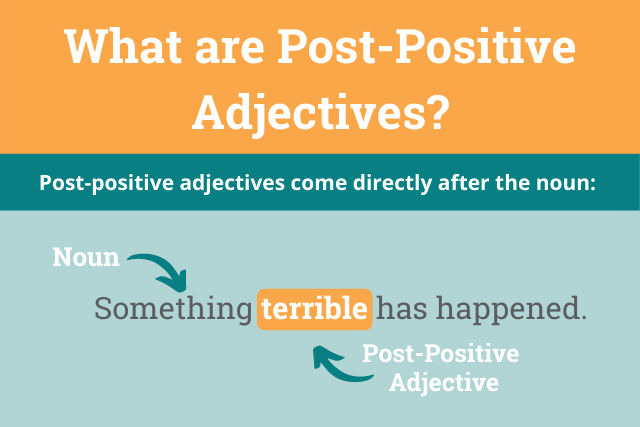
These adjectives are postpositive because of where they are in the sentence. If we move them around, their type can change.
For example, if I wrote:
- I have a terrible headache.
... then the adjective terrible goes back to being an attributive adjective.
When Does a Noun Become an Adjective?
Adjectives usually modify nouns. But sometimes, a noun can be used in place of an adjective to describe another noun.
Here are some examples of nouns being used as adjectives:
- Clothes shop
- Ladies room
- Sports car
- Ticket office
- Love story
- Running shoes
- Tennis club
In these cases, the noun being used as an adjective always comes before the main noun in the phrase.
You can then use adjectives to describe these phrases:
- The busy clothes shop
- Her new running shoes
- The fastest race horse
Now you know how to identify the different types of adjectives. But what happens if you want to use more than one adjective together?
What Order Do Adjectives Go In?
If you use multiple adjectives before a noun, they need to go in the right order. We’re big fans of breaking grammar rules, but the order of adjectives is one that you pretty much always need to follow.
If you’re a native English speaker, you might not even notice that you put adjectives in a certain order. Check out this tweet:
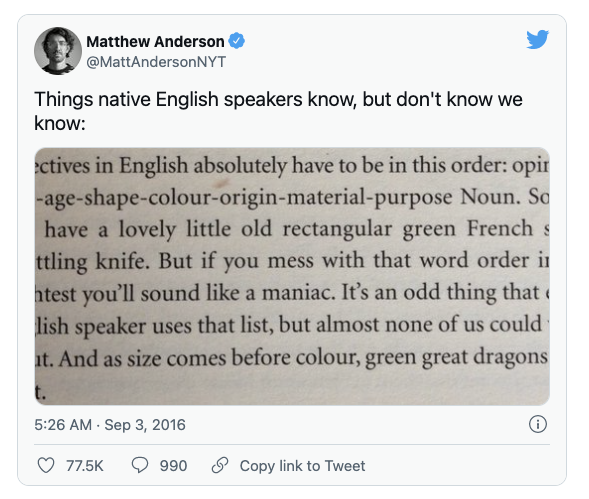
For fun, let’s try messing up that order (yes, we said fun; we’re grammar nerds here at ProWritingAid).
- I have a rectangular old little whittling lovely French green silver knife.
Sounds strange, right?
We will say, this is for illustrative purposes only. You shouldn’t use this many adjectives in one sentence. It will distract your reader and dilute your meaning rather than strengthen it. More on that later.
So, what order do adjectives go in?
Opinion → Size → Age → Shape → Color → Origin → Material → Purpose
Examples of adjectives in the correct order:
- The pretty purple cotton dress.
- The gnarly old tree.
- The big green monster.
Examples of adjectives in the wrong order:
- The cotton purple pretty dress.
- The old gnarly tree.
- The green big monster.
Here’s a handy chart to help you get your adjective order right every time:
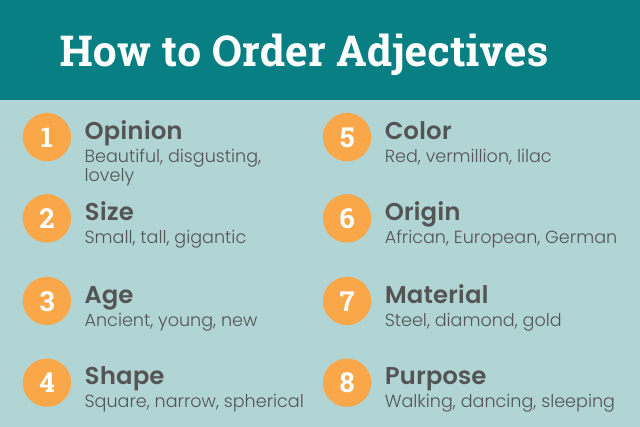
What Is an Adjective Phrase?
An adjective phrase is a group of two or more words (including an adjective) that describe a noun.
Adjective phrases can be made up of:
- A string of two or more adjectives
- An adverb and an adjective
- An intensifier and and adjective
The adjective can appear anywhere in the group.
Here are some examples of adjective phrases:
The runner was extremely fast.
The weather was fairly sunny.
He is rather arrogant.
The pastry was flaky, buttery, and delicious.
The apartment is as clean as a whistle.
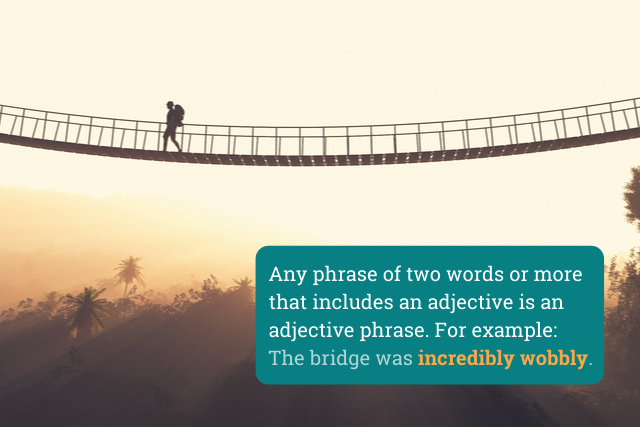
What Is a Predicate Adjective?
Predicate adjectives modify the subject of a sentence. For an adjective to be a predicate adjective, the sentence must also contain a linking verb.
Let’s look at an example.
In the sentence "The cat is black," the subject of the sentence is "cat," the predicate adjective is "black" and the linking verb is "is."
Here are some more examples. The adjectives are highlighted and the linking verbs are in bold.
The music sounds jarring. The light appeared bright. His whining became unbearable. That gift would be perfect for Samantha.
Looking for more examples of adjectives? Check out this detailed list of adjectives starting with "a". We also have a full list of positive adjectives.
How Do Adjectives Make Your Writing More Effective?
Descriptive adjectives can help you convey ideas, images, and tone to your reader. However, if you rely on imprecise and overused adjectives, you could actually put your reader off.
Not all adjectives are equal. You should avoid using weak adjectives in your writing. But how do you spot a weak adjective?
Examples of Weak Adjectives
If you have used intensifiers like very or really to make your adjective stronger, you could probably be using a better adjective.
Take this sentence:
- She was very angry.
Your idea of very angry could be completely different to mine. I might imagine someone tearing their hair out, shouting, stomping around. You might see someone with a slightly furrowed brow and a frown.
However, if we change very angry to furious, we’re much more likely to imagine similar things.
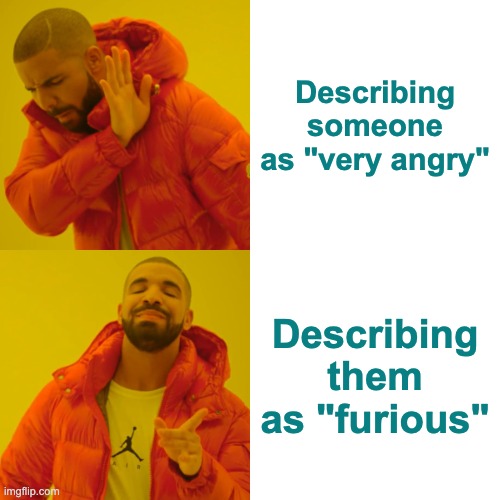
Here are a few more examples of weak adjectives and how we can replace them with strong ones:
Weak: Happy + very = I’m very happy.
Strong: I’m ecstatic.
Weak: Hot + very = It’s very hot out today.
Strong: It’s sweltering out today.
Weak: Sleepy + very = She looks very sleepy.
Strong: She looks exhausted.
Weak: Glad + very = He’ll be very glad to see you.
Strong: He’ll be delighted to see you.
Weak: Funny + very = You’re very funny.
Strong: You’re hilarious.
Weak: Dirty + very = That dog is very dirty.
Strong: That dog is filthy.
Weak: Big + very = The elephant in the room is very big.
Strong: The elephant in the room is enormous.
Imprecise vs. Precise Adjectives
You should also avoid using too many imprecise adjectives. Take this example:
- It was a beautiful warm day.
We don’t know what the writer means by beautiful here, and everyone’s idea of warm is different. Here’s how we could rewrite that sentence using more specific adjectives:
- The sun had drawn people out into the balmy air, and the sky was such a deep blue you could almost dive into it.
Now we have a better idea of the quality of the day. And we haven’t just added stronger adjectives.
If you spot weak adjectives in your writing, it’s often a sign that you need to rework your sentence to give your reader some more information. Why does it matter that the day was beautiful and warm?
How to Use Adjectives in Business Writing
Adjectives aren’t just for fiction writers. Let’s look at how this works in a business writing context.
- We made a good deal with them. We’ll be able to implement a better sales strategy going forward.
Good and better are both pretty vague. It’s not clear why the deal is good or how it will lead to better strategy. Let’s expand:
- We made a mutually beneficial deal with them. Now our sales strategies are aligned, and we can work together to target customers instead of sending conflicting messages.
Stuck for precise adjectives to use in your business writing? Here are 35 powerful business-focussed adjectives.
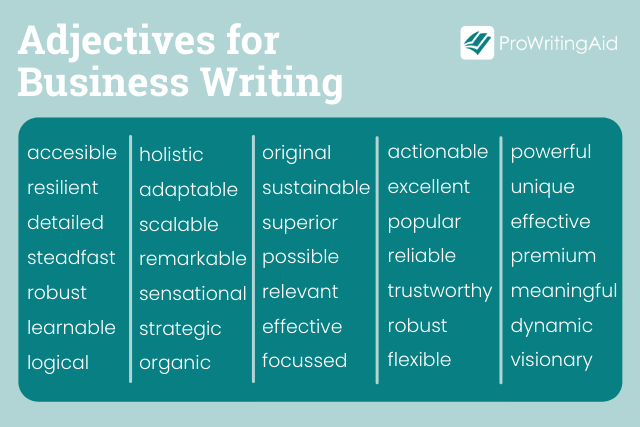
How to Avoid Weak Adjectives
Which adjectives should you avoid? Here are 100 common adjectives that could make your writing vague.
Remember, it’s fine to use these, but consider if you could replace them with something more powerful.
100 Most Common Adjectives
| Afraid Angry Annoying Awful Bad Better Big Boring Brave Busy Charming Clear Clever Closed Cold Comfortable Confused Cool Crowded Dark Difficult Dirty Dry Easy Embarrassing Expensive Fast Friendly Fun Funny Good Great Grumpy Guilty |
Handsome Happy Healthy Helpful High Horrible Hot Hungry Important Innocent Interesting Jolly Kind Large Lazy Light Long Loud Lovely Lucky Mean Modern Natural Nervous New Nice Normal Old Open Perfect Plain Pretty Proud Quaint |
Quiet Real Sad Scary Selfish Short Silly Sleepy Slow Small Soft Strange Strong Stupid Successful Super Sweet Talented Tall Tasty Tense Thin Thirsty Tired Ugly Unnatural Unusual Warm Weak Wet Worse Young |
|---|
How to Strengthen Your Adjectives
You could pick out all of your adjectives with a highlighter and then come up with synonyms for each of them. Sound like a lot of work? We think so too.
ProWritingAid’s Thesaurus Report will highlight all of the adjectives in your document and show you synonyms for each of them.

As we said above, replacing your weak adjectives isn’t always the answer. If none of the synonyms look quite right for the tone you’re trying to set, consider re-working your sentence to get your point across more effectively.
What Are Some Examples of Adjectives to Describe People?
A
| able abnormal absent-minded active adaptable adventurous affable affectionate agile agreeable |
alert amazing ambitious amiable amicable amusing analytical angelic apathetic apprehensive |
ardent argumentative artificial artistic assertive attentive average awesome awful |
|---|
B–C
| balanced beautiful blunt boisterous brave bright brilliant broad-minded buff callous calm candid cantankerous capable careful careless cautious charming cheerful |
chic childish childlike churlish civil clean clever clumsy coherent cold collaborative communicative compassionate competent composed conceited condescending confident confused |
conscientious considerate content convivial cool cool-headed cooperative cordial courageous courteous cowardly crafty cranky crass creative critical cruel curious cynical |
|---|
D–E
| dainty decisive deep deferential deft delicate delightful demonic demure dependent depressed determined devoted diligent diplomatic direct dirty disagreeable |
discerning discerning discreet disruptive distant distraught distrustful dramatic dreary drowsy dull dutiful dynamic eager earnest easygoing efficient egotistical |
elfin emotional empathetic encouraging energetic enterprising enthusiastic evasive even-tempered exacting excellent excitable experienced extroverted exuberant |
|---|
F–H
| fabulous fair-minded faithful fastidious fearless ferocious fervent fiery flabby flaky flashy focused forceful frank |
friendly funny fussy generous gentle gloomy gluttonous good grave great gregarious grouchy guarded hard-working |
hateful hearty helpful hesitant honest hopeful hostile hot-headed humorous hysterical |
|---|
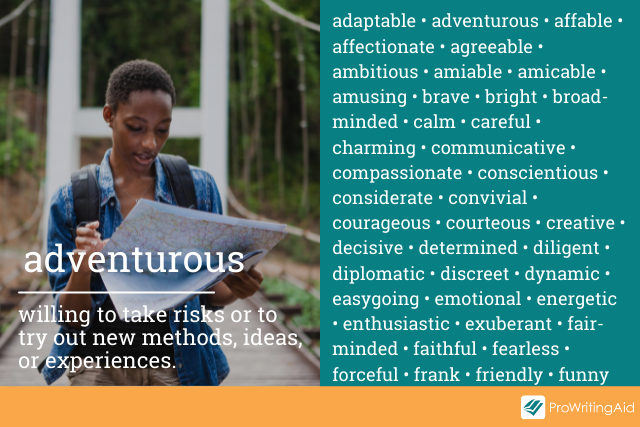
I
| idiotic idle illogical imaginative immature immodest impartial impatient impetuous impractical impressionable impressive |
impulsive inactive incisive incompetent inconsiderate inconsistent indefatigable independent indiscreet indolent industrious inexperienced |
insensitive inspiring intellectual intelligent interesting intolerant introverted intuitive inventive irascible irritable irritating |
|---|
J–M
| jocular jolly jovial joyous judgmental keen kind laid-back lame lassiez-faire lazy lean leery lethargic |
lean leery lethargic level-headed listless lively local logical long-winded lovable lovely loving loyal maternal |
mature mean meddlesome mercurial methodical meticulous mild miserable modest moody moronic morose motivated musical |
|---|
N–O
| naive nasty natural naughty neat negative nervous nice |
noisy normal nosy numb obliging obnoxious old-fashioned one-sided |
optimistic orderly ostentatious outgoing outspoken |
|---|
P
| passionate passive paternal patient peaceful peevish pensive persevering persistent pessimistic petulant philosophical |
picky pioneering placid plain plain-speaking playful pleasant plucky polite popular positive powerful |
practical precise prejudiced pretty pro-active proficient proud provocative prudent punctual |
|---|
Q–R
| quarrelsome querulous quick quick-tempered quick-witted quiet rational realistic |
reassuring reclusive reflective reliable reluctant resentful reserved resigned |
resourceful respected respectful responsible restless revered ridiculous romantic |
|---|
S
| sad sassy saucy sedate self-assured self-confident self-disciplined selfish sensible sensitive sentimental serene serious sharp short-tempered shrewd shy silly sincere sleepy |
slight sloppy slothful slovenly slow smart snazzy sneering snobby sober sociable somber sophisticated soulful soulless sour spirited spiteful stable staid |
steadfast steady stern stoic straightforward striking strong stupid sturdy subtle sulky sullen supercilious superficial supportive surly suspicious sweet sympathetic |
|---|
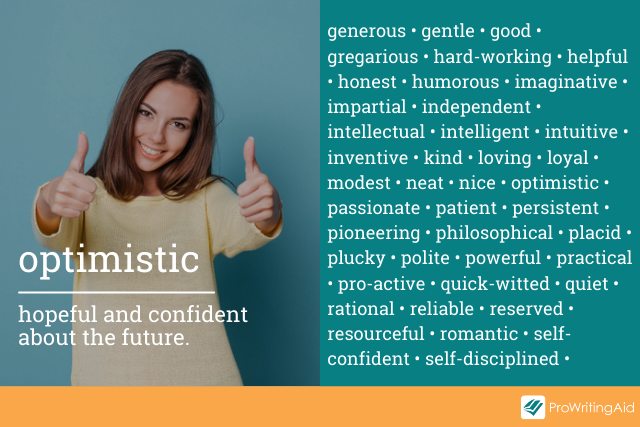
T–U
| tactful tactless talented testy thinking thoughtful thoughtless tidy timid tired tolerant touchy tough |
tranquil trustworthy ugly unaffected unassuming unbalanced uncertain uncooperative undependable understanding unemotional unfriendly unguarded |
unhelpful unimaginative unique unmotivated unpleasant unpopular unreliable unsophisticated unstable unsure unthinking unwilling |
|---|
V–Z
| versatile vigilant volcanic vulnerable warm warmhearted wary |
watchful weak well-behaved well-developed well-intentioned well-respected well-rounded |
willing witty wonderful youthful zany zealous |
|---|
Taking the time to review your adjectives can help you write stronger, more specific content that helps you achieve your purpose faster. Whether that’s conveying findings in a report or creating a spellbinding scene in a novel, using adjectives carefully pays.
Now you know how adjectives work, and what to avoid, you’re ready to start using adjectives to enhance your points and create intricate descriptions. Happy writing!